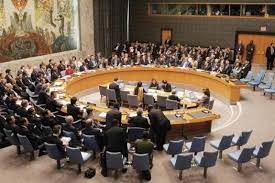NEW YORK (AFP): The Security Council on Thursday renewed the United Nations Mission in Afghanistan (UNAMA) for another year, while also asking for recommendations on the best way for the international community to continue its work in the Taliban-ruled country.
The 15-member council unanimously adopted two resolutions, both drafted by the United Arab Emirates and Japan.
The first “stresses the critical importance of a continued presence of UNAMA” and other UN agencies within Afghanistan, which has been under Taliban rule since the hardline Islamist group took control of Kabul in August 2021.
Thursday’s resolution, which extends the mission until March 17, 2024, does not change the UNAMA’s mandate, as defined by last year’s resolution, “in promoting peace and stability in Afghanistan.”
The second resolution asks Secretary-General Antonio Guterres to conduct an “integrated, independent assessment” of the situation in the country, and report back to the Security Council by November 17 with “forward-looking recommendations for an integrated and coherent approach among relevant political, humanitarian, and development actors.”
The report should include information on addressing “humanitarian (challenges), human rights and especially the rights of women and girls, religious and ethnic minorities, security and terrorism, narcotics, development, economic and social challenges, dialogue, governance and the rule of law,” the resolution said.
“We’re all aware the situation in Afghanistan is extremely challenging, and that our options are actually very limited, but the status quo is not sustainable,” UAE UN ambassador Lana Zaki Nusseibeh said.
She noted that, given the Taliban’s tightening restrictions on Afghan women and girls, some people, “including many Afghan women,” have accused the global community of lacking a “coordinated international political strategy” for dealing with the challenges within the country.
“By requesting this independent assessment, the council is taking a careful and measured response to a difficult crisis with outside expertise and fresh thinking,” Nusseibeh said.
US Senate acts to end war authorization
Almost exactly 20 years after US forces invaded Iraq to remove Saddam Hussein from power, the US Senate moved Thursday to revoke the law that authorized then-president George W. Bush to launch the war.
In a procedural vote that came over a decade after the war’s official end, senators from both parties strongly supported cancelling the 2002 Authorization for Use of Military Force (AUMF), which empowered Bush to send US forces to Iraq.
The same bill also revokes the 1991 AUMF that empowered Bush’s father president George HW Bush to attack Iraq after Saddam’s forces invaded Kuwait.
“The Iraq War has itself long been over. This AUMF has outlived its purpose and we can no longer justify keeping it in effect,” said Senate Majority Leader Chuck Schumer.
“Every year we leave these AUMFs on the books is another year that a future administration can abuse them,” he said.
The 2002 AUMF has been mostly moribund.
But, because it allows the president to order any actions seen as threatening to Iraqi democracy, it has been used to justify several military actions in the past decade, like allowing US troops in Iraq to retaliate against Iran-allied militias that have fired rockets at bases housing US troops.
Most notably, it was cited in the January 2020 US assassination in Baghdad of Iranian general Qasem Soleimani, ordered by Donald Trump.
Because of that, there have been fears that a president could use the AUMF to go to war with Iran, citing a threat from Tehran to Iraq, said Scott Anderson, an expert in national security law at Brookings Institution
“The biggest risk it presents is that people will use it more broadly,” beyond Congress’s original intent, Anderson said.
Since the beginning of his administration in 2021, President Joe Biden has urged Congress to revoke the 1991 and 2002 AUMFs.
But the legislation — which could come next week to a final vote in the Senate and then be sent to the House of Representatives — does not take action against the 2001 authorization of war in Afghanistan.
That authorization, with broad powers for the president to order military force against Al-Qaeda and its offshoots, has been used to carry on sustained actions in numerous countries including Syria, Yemen, Somalia and other parts of Africa.
In a statement Thursday on the revocations of the 1991 and 2002 AUMFs, the Biden administration said the president is ready to work with Congress to replace other “outdated authorizations for the use of military force” with “a narrow and specific framework more appropriate to protecting Americans from modern terrorist threats.”







